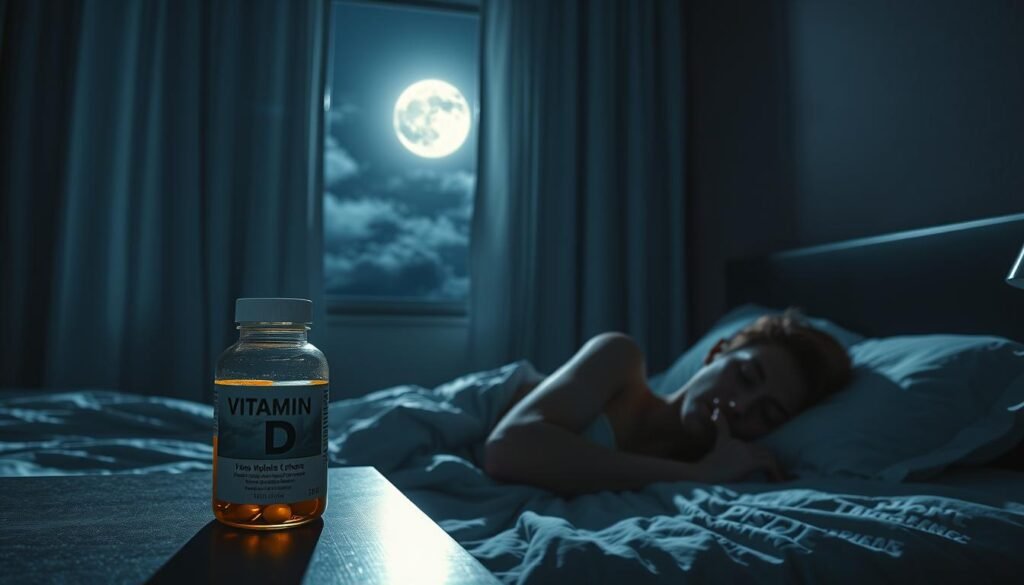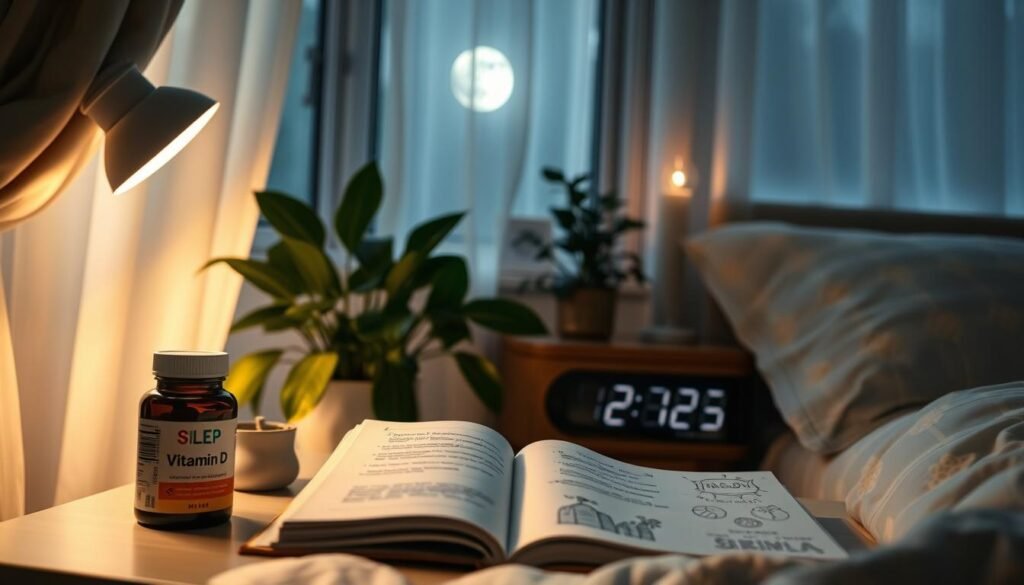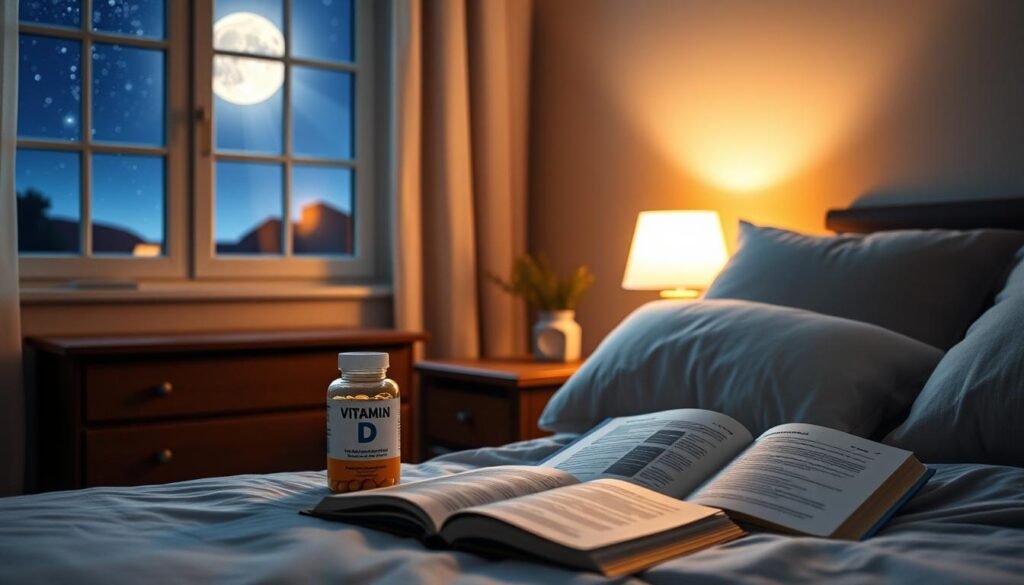About 40% of adults in the U.S. don’t get enough vitamin D. They fall below the optimal 30 ng/mL needed for health. This shortage doesn’t just hurt bone health; it also affects sleep quality. So, we wonder: does low vitamin D lead to insomnia?
It’s key to understand how these two are linked. Not sleeping enough can cause mental and physical problems, including sleep issues from not having enough vitamin D. Studies show that vitamin D affects our sleep cycles. They suggest that taking more vitamin D could help with sleep troubles. For deeper insight, see a detailed study here.
Key Takeaways
- Vitamin D deficiency can mess with sleep, leading to insomnia.
- It is important to have more than 30 ng/mL of vitamin D for health perks.
- Not sleeping enough is linked to increased pain sensitivity and health issues.
- Vitamin D helps control serotonin and melatonin, which affect sleep quality.
- Seasons can change vitamin D levels and affect sleep disorders.
- Studies indicate that vitamin D supplements can better sleep in those lacking it.
Understanding Vitamin D and Its Importance
Vitamin D is key in keeping us healthy and well. It helps our bones stay strong, keeps our immune system fighting, and even affects how well we sleep. Our bodies make this nutrient when we’re in the sun. We can also get it from foods we eat.
About 40% of U.S. adults don’t get enough vitamin D. This is a big deal because it does more than just help our bones. Not having enough vitamin D can make it hard to sleep well. It’s linked to problems like insomnia and sleep apnea. Getting enough helps our bodies use calcium and phosphate. This makes us feel more energetic and sleep better.
To understand how much vitamin D we need, look at this table. It shows the recommended amount for different ages:
| Age Group | Recommended Daily Intake (mcg/IU) |
|---|---|
| Babies (0-12 months) | 10 mcg (400 IU) |
| Children (1-13 years) | 15 mcg (600 IU) |
| Teenagers (14-18 years) | 15 mcg (600 IU) |
| Adults (19-70 years) | 15 mcg (600 IU) |
| Older Adults (71+ years) | 20 mcg (800 IU) |
Some people, like those who don’t get much sun or have certain health issues, risk vitamin D deficiency more. This lack can mess with bone health and cause tiredness and sleep problems. Knowing how vitamin D works in our bodies is key to keeping healthy. If you want to learn more, visit this article.
Symptoms of Vitamin D Deficiency
It’s important to know the symptoms of vitamin D deficiency for good health. Many people don’t notice the signs. These symptoms can affect both the body and mind. They include feelings of fatigue, mood changes, and thinking difficulties. These issues can make life less enjoyable.
Common Signs of Deficiency
Many people don’t realize how common vitamin D deficiency is. Those with obesity face a 35% greater risk of being deficient. People who are obese have a 24% higher chance of this issue than those who are just overweight. Other symptoms include:
- Frequent infections
- Muscle weakness
- Bone pain
- Worsening skin issues like eczema
- Dental problems like cavities
How Deficiency Affects Sleep Patterns
Research is showing more often how vitamin D deficiency affects sleep. Not enough vitamin D can lead to disturbed sleep and more insomnia. A study on college students showed those with insomnia also felt more anxious and depressed. About 60% of insomniacs had high anxiety levels, and 40% had signs of depression. Also, insomnia was closely linked with pain in muscles and bones, affecting sleep quality.
These points make it clear how vitamin D deficiency and sleep issues are connected. Knowing the signs of vitamin D deficiency can help fix sleep problems early.
The Connection Between Vitamin D and Sleep Quality
Exploring how vitamin D affects sleep quality is key to understanding sleep disorders. It’s clear that enough vitamin D helps ease sleep problems. Many with low vitamin D levels feel very tired, can’t sleep well, and have irregular sleep patterns. Since around 40% of U.S. adults lack enough vitamin D, it’s a big issue for public health.
Research Insights on Vitamin D and Sleep Disorders
Studies show a strong link between vitamin D, sleep disorders, and how well we sleep. An analysis of over 9,000 people found a clear connection: low vitamin D often leads to sleep issues. Not having enough vitamin D can make insomnia worse. This is due to stress and bad habits. Thus, boosting vitamin D might help reduce insomnia. You can learn more about the research here.
The Role of Vitamin D in Circadian Rhythm Regulation
Vitamin D does more than just keep bones strong; it also helps our body’s natural clock. It works by affecting areas in the brain that control our sleep and wake cycles. Studies suggest vitamin D helps make melatonin, which we need for good sleep. This shows how important it is to have enough vitamin D for sleep and to avoid sleep problems.
Vitamin D Supplements and Sleep Improvement
Vitamin D supplements are being noticed for their role in better sleep. Many studies link higher vitamin D levels to improved sleep. People with low vitamin D often sleep less and feel more tired during the day. Taking vitamin D supplements might help with these sleep problems.
Studies show people sleeping about 45 minutes longer after taking vitamin D supplements. Their vitamin D levels went from 18.57 ng/mL to 26 ng/mL. This shows how vitamin d for better sleep could work. As vitamin D levels go up, so does the quality of sleep.
InsideTracker says the best vitamin D levels for sleep are between 40 to 100 ng/mL. Since many people already take vitamin D supplements, they could be a good option for those struggling with sleep. It’s important to check your vitamin D levels regularly. Getting enough from just the sun and food can be hard for many people.

It’s not just about vitamin D. Low levels of vitamins like B6, B12, C, and E can also make it hard to sleep. Boosting these vitamins might lead to better sleep. Those with insomnia might benefit from focusing on vitamin D and other important nutrients. This can be a key part of getting good sleep.
| Nutrient | Effect on Sleep | Recommended Levels |
|---|---|---|
| Vitamin D | Enhances sleep duration and efficiency | 40 – 100 ng/mL |
| Vitamin B12 | Low levels linked to insomnia | Refer to individual testing |
| Vitamin C | Higher levels associated with better sleep quality | Refer to individual testing |
| Vitamin E | Associated with improved sleep quality | Refer to individual testing |
| Vitamin B6 | Can help improve sleep and dream recall | Refer to individual testing |
Can Vitamin D Cause Insomnia?
Understanding the link between vitamin D and sleep is important. Low levels of vitamin D are linked with sleep problems like insomnia. Studies show that not having enough vitamin D can cause symptoms such as tiredness and brain fog. These symptoms can make it hard to sleep well. Around 40% of adults in the U.S. don’t have enough vitamin D. This fact makes us wonder about its role in sleep quality.
Exploring the Relationship between Vitamin D and Insomnia
The connection between not getting enough vitamin D and insomnia has been studied a lot. Research has found that low vitamin D levels can make sleep disorders worse. People who don’t get enough vitamin D often have muscle weakness and feel confused. These issues can make insomnia worse. In kids, not getting enough vitamin D has been linked to sleeping less and going to bed late. These studies show that vitamin D may affect how we sleep.
Studies on Vitamin D Overdose and Sleep Problems
Taking too much vitamin D can also cause sleep issues, known as vitamin D overdose insomnia. Though vitamin D is crucial for health, too much can disturb sleep. It’s important to find a balance with supplements, as both too little and too much can cause insomnia. By checking vitamin D levels and talking to doctors, people can find the right dose. This way, they can improve their sleep quality.
| Vitamin D Level | Effect on Sleep |
|---|---|
| Deficiency ( | Linked to insomnia and sleep disturbances |
| Optimal Levels (30-50ng/mL) | Improved sleep quality and reduced fatigue |
| Overdose (>100ng/mL) | Potential sleep disturbances and insomnia |
Effects of Vitamin D on Sleep Duration
Recent studies have turned the spotlight on how vitamin D relates to sleep. They show a link between low vitamin D levels and bad sleep quality. This often leads to less sleep. People who get enough vitamin D tend to sleep longer, showing how it might help with sleep.
Vitamin D plays a vital role in the body that may help us sleep better. It connects to certain parts of the brain that control sleep. These connections help manage stress and balance calcium in the body, which can affect sleep. Also, not having enough vitamin D might make you wake up more at night. This can break up your sleep and cut into your rest time.
There’s also a tie between vitamin D and melatonin, which helps control our sleep cycle. Enough vitamin D can help make melatonin, which affects how well we sleep. Not having enough vitamin D might mess with making melatonin. This can lead to sleep problems like insomnia.
A lot of people around the world don’t get enough vitamin D. This lack can lead to sleep problems like insomnia. Taking more vitamin D could help fix these sleep issues and make you sleep longer. Looking into how vitamin D affects sleep could help us find ways to sleep better and tackle insomnia more effectively.
| Vitamin D Levels | Link to Sleep Duration |
|---|---|
| Low Levels | Increased risk of poor sleep quality and shorter sleep duration |
| Adequate Levels | Associated with longer sleep durations and better sleep quality |
| Supplementation | Can alleviate severity of sleepiness and fatigue |
| Interactions with Melatonin | Influences production and regulation, affecting sleep duration |
Vitamin D’s Impact on Melatonin Production
It’s essential to grasp how vitamin D affects melatonin production to better sleep. Vitamin D helps create melatonin, vital for healthy sleep cycles. Studies show that enough vitamin D relates to more melatonin, enhancing sleep regulation.
Understanding Melatonin and Its Role in Sleep Regulation
Melatonin, made by the pineal gland, varies in daily amounts. It’s key for circadian rhythms, affecting sleep. Notably, babies start making melatonin at about three months, underlining its early life importance.
As people age, their melatonin decreases, usually starting by late twenties. This reduction continues into the fifties.
Several external things lower melatonin, like bright lights at night, certain meds, and some lifestyle habits. But, vitamin D supports melatonin levels, which is crucial for sleep. Given that around 40% of U.S. adults lack enough vitamin D, this is crucial for those with sleep issues. Vitamin D supplements might boost melatonin, helping with sleep troubles.
Melatonin is also a strong antioxidant, protecting cells. Research is looking into how vitamin D and melatonin together might reduce oxidative stress.
Knowing the link between vitamin D and melatonin shows why enough vitamin D matters for health. For better sleep, focusing on vitamin D could help. Check out this article for more on vitamin D shortage and sleep issues.
Recommended Dosage of Vitamin D for Optimal Sleep
Knowing the right vitamin D dosage insomnia helps improve sleep. For adults, the daily vitamin D recommended intake is 600 IU (15 micrograms). This is important for anyone aged 1 to 70 to maintain health and good sleep. About 42% of U.S. adults don’t get enough vitamin D.

Low vitamin D can harm health, including sleep quality. People who sleep less than five hours may have low vitamin D levels. It’s important to keep vitamin D at the right level for better sleep.
Though 600 IU is the general advice, individual needs differ. Things like sun exposure, where you live, and health can change what you need. Not getting enough sleep can lead to health issues, making vitamin D important for sleep and health. Regular health checks and custom supplements help, especially to improve sleep.
If you have insomnia, adjusting vitamin D might help. Knowing signs of vitamin D shortage, like tiredness and weak muscles, is key. The aim is to sleep better as part of staying healthy overall.
For more info, check out connections between insomnia and various medical conditions.
Dietary Sources of Vitamin D
Vitamin D is key for our health, including our sleep. Sadly, around 40% of U.S. adults don’t have enough vitamin D. To fight this, there are dietary sources of vitamin D that can boost levels and improve sleep.
Here are some top vitamin D foods:
- Fatty fish: Think salmon, mackerel, and sardines. They’re packed with vitamin D.
- Fortified foods: Look for dairy, orange juices, and cereals with added vitamin D.
- Egg yolks: They’re an easy way to get more vitamin D into your diet.
- Mushrooms: If they’ve seen UV light, they can be a good source for those on a plant-based diet.
Eating these vitamin D foods can help with fatigue and muscle weakness. Getting enough vitamin D from food can help you sleep better. It helps with issues like insomnia and sleep apnea.
If you’re worried about your vitamin D levels, watch what you eat. Adding fortified foods and fatty fish can boost your vitamin D. This can improve sleep and lower the risk of related health problems.
To learn more about how not having enough vitamin D affects sleep, visit this helpful site.
| Vitamin D Sources | Vitamin D Content (IU per 100g) |
|---|---|
| Salmon (cooked) | 526 |
| Mackerel (cooked) | 360 |
| Sardines (canned in oil) | 272 |
| Fortified milk | 120 |
| Egg yolk | 37 |
| Fortified orange juice | 100 |
Making these vitamin D-rich foods a priority can boost your health and may help you sleep better at night.
Expert Opinions on Vitamin D and Sleep Quality
Many health experts believe vitamin D greatly affects sleep quality. They’ve found a clear connection between vitamin D levels and how well we sleep. A lot of research shows not having enough vitamin D can mess up sleep, cause insomnia, and lead to worse sleep quality. It’s worrisome that about 40% of Americans have low levels of vitamin D.
Dr. David Klapper, a sleep medicine expert, notices people with low vitamin D often sleep poorly. He sees a link between not enough vitamin D and sleep problems like sleep apnea. Experts like him are working more to fix vitamin D shortages to help people sleep better.
Experts point out that more indoor living and less sun time are causing more vitamin D shortages. Especially in winter, some places don’t get enough sunlight for good vitamin D levels. Age, where you live, and the time of year can change how lacking vitamin D affects sleep. This makes the issue complex for professionals to deal with.
To better sleep quality, experts suggest a plan that fits the person. Vitamin D supplements can range from 400 to 5,000 IU, based on what’s needed. Dr. Klapper says blood tests are crucial to find the right dose, especially for those with big shortages. He also recommends talking to a healthcare provider to use supplements safely with other medicines.

In summary, experts stress that good vitamin D levels are key for better sleep and health. Their advice could help improve sleep and overall well-being.
Conclusion
A look at the link between vitamin D and insomnia uncovers important findings. Studies show that not having enough vitamin D can hurt sleep quality. This leads to insomnia and sleep problems. Getting enough vitamin D through supplements and food changes can improve sleep quality and length. This matches with health guidelines.
Research backs the idea that people who get 7-8 hours of sleep usually have better vitamin D levels. This idea shows that the right amount of vitamin D can lower sleep disorder risks. However, we still need more studies to fully understand vitamin D’s role in sleep health.
If you’re having trouble sleeping, it might help to check your vitamin D levels and make some life changes. The relationship between nutrition, lifestyle, and sleep quality highlights the need for a balanced approach to health.